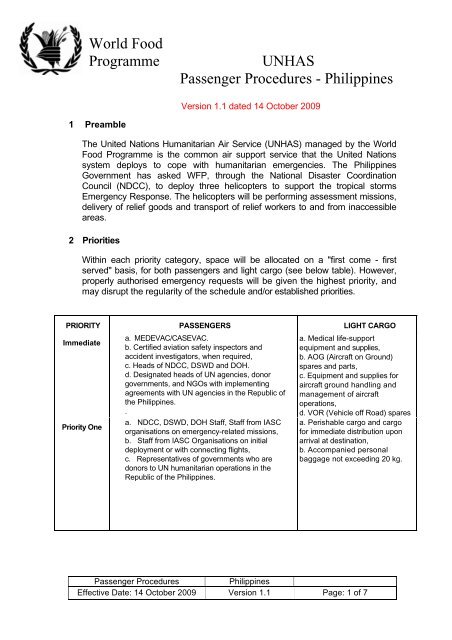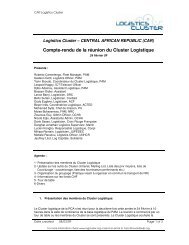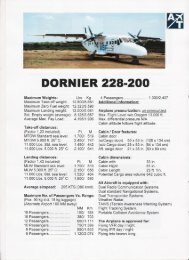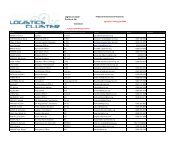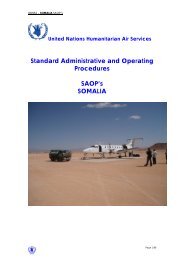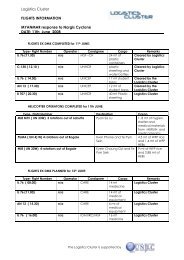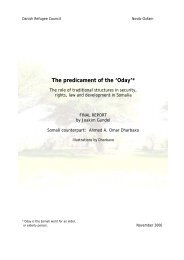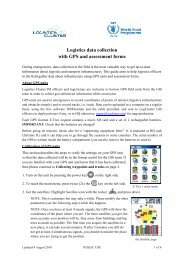UNHAS Philippines Passenger Procedures - Logcluster.org
UNHAS Philippines Passenger Procedures - Logcluster.org
UNHAS Philippines Passenger Procedures - Logcluster.org
You also want an ePaper? Increase the reach of your titles
YUMPU automatically turns print PDFs into web optimized ePapers that Google loves.
World Food<br />
Programme <strong>UNHAS</strong><br />
<strong>Passenger</strong> <strong>Procedures</strong> - <strong>Philippines</strong><br />
1 Preamble<br />
Version 1.1 dated 14 October 2009<br />
The United Nations Humanitarian Air Service (<strong>UNHAS</strong>) managed by the World<br />
Food Programme is the common air support service that the United Nations<br />
system deploys to cope with humanitarian emergencies. The <strong>Philippines</strong><br />
Government has asked WFP, through the National Disaster Coordination<br />
Council (NDCC), to deploy three helicopters to support the tropical storms<br />
Emergency Response. The helicopters will be performing assessment missions,<br />
delivery of relief goods and transport of relief workers to and from inaccessible<br />
areas.<br />
2 Priorities<br />
Within each priority category, space will be allocated on a "first come - first<br />
served" basis, for both passengers and light cargo (see below table). However,<br />
properly authorised emergency requests will be given the highest priority, and<br />
may disrupt the regularity of the schedule and/or established priorities.<br />
PRIORITY PASSENGERS LIGHT CARGO<br />
Immediate<br />
Priority One<br />
a. MEDEVAC/CASEVAC.<br />
b. Certified aviation safety inspectors and<br />
accident investigators, when required,<br />
c. Heads of NDCC, DSWD and DOH.<br />
d. Designated heads of UN agencies, donor<br />
governments, and NGOs with implementing<br />
agreements with UN agencies in the Republic of<br />
the <strong>Philippines</strong>.<br />
.<br />
a. NDCC, DSWD, DOH Staff, Staff from IASC<br />
<strong>org</strong>anisations on emergency-related missions,<br />
b. Staff from IASC Organisations on initial<br />
deployment or with connecting flights,<br />
c. Representatives of governments who are<br />
donors to UN humanitarian operations in the<br />
Republic of the <strong>Philippines</strong>.<br />
a. Medical life-support<br />
equipment and supplies,<br />
b. AOG (Aircraft on Ground)<br />
spares and parts,<br />
c. Equipment and supplies for<br />
aircraft ground handling and<br />
management of aircraft<br />
operations,<br />
d. VOR (Vehicle off Road) spares<br />
a. Perishable cargo and cargo<br />
for immediate distribution upon<br />
arrival at destination,<br />
b. Accompanied personal<br />
baggage not exceeding 20 kg.<br />
<strong>Passenger</strong> <strong>Procedures</strong> <strong>Philippines</strong><br />
Effective Date: 14 October 2009 Version 1.1 Page: 1 of 7
World Food<br />
Programme <strong>UNHAS</strong><br />
<strong>Passenger</strong> <strong>Procedures</strong> - <strong>Philippines</strong><br />
Note: Any entity not covered in the priority list above can request to be registered by<br />
following the Typhoon Ketsana (“Ondoy”), Guidelines for responding international<br />
agencies on registration which can be consulted on<br />
http://www.un.<strong>org</strong>.ph/response.html<br />
3 Agencies' Responsibilities - focal points<br />
3.1. Each eligible entity/agency mentioned in the priority list is<br />
required to fill out and submit to <strong>UNHAS</strong> the Focal Point Assignment Form with<br />
no more than three focal points, who will be authorised to make booking<br />
requests and cancellations on behalf of the entity/agency, with full names,<br />
titles, specimen signatures, email addresses and other contact details.<br />
3.2. The eligibility of passengers to travel on <strong>UNHAS</strong> flights will be the<br />
exclusive responsibility of each entity/agency submitting a request for travel.<br />
<strong>UNHAS</strong> will consider any request for travel submitted by the designated<br />
entity/agency's focal point(s) as a valid request from this entity/agency.<br />
3.3. <strong>UNHAS</strong> reserves the right to seek clarification and verification of<br />
details on lists of passengers submitted by entity/agency designated focal<br />
points.<br />
3.4. Entities/agencies are requested to ensure that passengers<br />
booked and eventually authorised to travel on <strong>UNHAS</strong> chartered helicopters<br />
have appropriate travel clearance - UN personnel are to have UNDSS Travel<br />
Authorisation and personnel staying in the field (for more than 1 day) are to<br />
notify their respective Government counterpart.<br />
4 Criteria for <strong>Passenger</strong> Transport<br />
4.1. Notwithstanding the priority criteria established in Section 2 above,<br />
<strong>UNHAS</strong> is only permitted to carry passengers directly involved in<br />
humanitarian relief operations implemented in the <strong>Philippines</strong>. This does<br />
not include family members and/or dependants of humanitarian staff.<br />
Any exception to this rule, appropriately justified, can only be authorized by<br />
the RC/HC, on a case by case basis.<br />
4.2. For a passenger to be authorized to travel, his/her name must<br />
appear on the passenger manifest list. No passenger will be authorised<br />
to board <strong>UNHAS</strong> chartered helicopters without being properly<br />
manifested, and issued a ticket as this is against aviation industry<br />
regulations.<br />
4.3. All required travel documents such as visa and/or security<br />
clearances are the sole responsibility of the traveller.<br />
4.4. At airports without proper screening facilities, manual inspection<br />
<strong>Passenger</strong> <strong>Procedures</strong> <strong>Philippines</strong><br />
Effective Date: 14 October 2009 Version 1.1 Page: 2 of 7
World Food<br />
Programme <strong>UNHAS</strong><br />
<strong>Passenger</strong> <strong>Procedures</strong> - <strong>Philippines</strong><br />
of luggage may be carried out by <strong>UNHAS</strong> staff or representatives, and in any<br />
case <strong>UNHAS</strong> staff or representatives might require to open and inspect any<br />
item or piece of luggage, and reserve the right to accept/reject them for<br />
carriage. <strong>Passenger</strong>s who do not comply with these procedures will be<br />
denied access to the flight.<br />
5 Bookings and Confirmation Process<br />
5.1. Booking of passengers and light cargo/parcels can only be<br />
made by eligible entity/agency designated focal points either directly (in<br />
person) at the <strong>UNHAS</strong> booking office in Manila, collocated with NDCC or via<br />
email to unhas.philippines@wfp.<strong>org</strong><br />
The <strong>UNHAS</strong> <strong>Passenger</strong>s Booking office is located next to NDCC Manila<br />
within the Camp Emiliio Aguinado, Quezon City, NCR<br />
The <strong>UNHAS</strong> <strong>Passenger</strong>s Booking office opening hours are:<br />
MONDAY - FRIDAY: 0800 -1700<br />
SATURDAY: 0800-1200<br />
SUNDAY: 0800-1200<br />
Bookings over the telephone will never be accepted<br />
5.2. Bookings must be received at least by noon the day before the<br />
flight, but not earlier than two weeks prior departure. All travellers are to<br />
confirm their travel the day before the flight.<br />
5.3. All passenger bookings must be made through the <strong>Passenger</strong><br />
Movement Request (PMR) process.<br />
5.4. Bookings should be made preferably by email, if not possible, in<br />
person at the booking office. The passenger booking office is located next to<br />
the NDCC Manila within the Camp Emiliio Aguinado, Quezon City, NCR. The<br />
requestor will then receive an e-mail containing confirmation and ticket by<br />
return e- mail. Confirmation of bookings must be made 1 day before of the<br />
actual flight.<br />
5.5. Flight tickets can be collected at the passenger booking office the<br />
day before the flight as from 15:00 Hrs. If the reservations are done by e-mail;<br />
the requestor will receive final confirmation and ticket by e-mail.<br />
5.6. Tickets are valid only for named person and shall not be<br />
exchanged or traded. It is the responsibility of passengers or agency to<br />
confirm passengers are manifested and to collect passenger tickets.<br />
<strong>Passenger</strong> <strong>Procedures</strong> <strong>Philippines</strong><br />
Effective Date: 14 October 2009 Version 1.1 Page: 3 of 7
World Food<br />
Programme <strong>UNHAS</strong><br />
<strong>Passenger</strong> <strong>Procedures</strong> - <strong>Philippines</strong><br />
5.7. The PMR must bear the signature of one of the authorised focal<br />
points.<br />
5.8. In case of limited seat availability on a particular flight, <strong>UNHAS</strong><br />
reserves the right to confirm booking for a maximum of five passengers from<br />
the same agency/entity.<br />
5.9. <strong>UNHAS</strong> will provide confirmation of booking, and booking<br />
reference number, within 24 hours of the submission of a PMR.<br />
Entities/agencies will be advised accordingly for passengers/cargo put on<br />
waiting list.<br />
5.10. Cancellation of confirmed bookings must be received by <strong>UNHAS</strong><br />
at least 24 hours before departure.<br />
5.11. <strong>UNHAS</strong> reserves the right to cancel any scheduled flight and<br />
will inform confirmed passengers as early as possible. Any re-booking on a<br />
successive <strong>UNHAS</strong> flight will require the submission of a new passenger<br />
movement request.<br />
5.12. <strong>Passenger</strong>s not listed on the manifest will not be authorized to<br />
travel, unless a specific, written authorization from the <strong>UNHAS</strong> Chief Air<br />
Transport officer is provided.<br />
6 Check-in<br />
6.1. <strong>Passenger</strong>s must carry a valid photo identity card from their<br />
parent <strong>org</strong>anisation or their UNLP, their flight ticket, and a copy of their<br />
security clearance to travel. <strong>Passenger</strong>s are recommended to carry<br />
photocopies of the relevant pages of their passports.<br />
6.2. <strong>Passenger</strong>s are requested to proceed to Villamor Airbase, Gate 1<br />
in Pasay City. Only cars featuring the <strong>UNHAS</strong> <strong>Passenger</strong>s sign – see Annex B<br />
– on their windscreen and with passengers featuring on the passenger<br />
manifest will be allowed into the Airbase. The personnel at the gate will check<br />
the names of the people in the car with those featuring on the passenger<br />
manifests.<br />
6.3. The vehicles transporting the passengers will proceed to the<br />
parking inside the base, located on Parades Street and straight form Gate 1<br />
hundred fifty meters on the left. There passengers will be transferred to a<br />
<strong>UNHAS</strong> bus who will transfer them to the passenger waiting area located on<br />
the flight line.<br />
6.4. Pick-up of the passengers arriving in Villamor Airbase will be done<br />
at the same parking as the passengers will be transported by the <strong>UNHAS</strong> bus<br />
from the flight line back to the Parking on Parades Street inside the Base.<br />
6.5. <strong>Passenger</strong>s are to report at the parking no later than one hour<br />
before the scheduled time of departure (STD). <strong>UNHAS</strong> reserves the right to<br />
<strong>Passenger</strong> <strong>Procedures</strong> <strong>Philippines</strong><br />
Effective Date: 14 October 2009 Version 1.1 Page: 4 of 7
World Food<br />
Programme <strong>UNHAS</strong><br />
<strong>Passenger</strong> <strong>Procedures</strong> - <strong>Philippines</strong><br />
consider passengers reporting after cut-off time as 'no-show' passengers.<br />
6.6. "Wait Listed" passengers will be allocated seats on a space<br />
available basis and according to their order of priority on the waiting list.<br />
6.7. Check-in for passengers returning to Manila from the Field will<br />
be undertaken by <strong>UNHAS</strong> staff when and where they are present. Otherwise<br />
a member of the Hub staff or a member of the aircraft crew will perform the<br />
check-in duties. Please report to the <strong>UNHAS</strong> staff or Hub staff in the morning<br />
of the day of the flight and he/she will inform you on the required check-In<br />
time.<br />
6.8. At airports/airstrips without <strong>UNHAS</strong> staff presence:<br />
The Pilot-in-Command will perform the check-in duties on behalf of <strong>UNHAS</strong><br />
on locations without <strong>UNHAS</strong> representation, in case of duplication of<br />
manifests at the outstations with conflicting information, the manifest<br />
presented by the Pilot-in-Command will be considered the latest<br />
amendment and therefore the valid manifest to be used.<br />
6.9. The Airport Office will be the focal point for all communications to<br />
the customers during the day of the flight performed for those customers.<br />
Should a flight or mission have to be rescheduled to a following day,<br />
customers shall contact the <strong>Passenger</strong> Booking Office to get confirmation of<br />
their bookings.<br />
7 <strong>Passenger</strong> Luggage and Small Cargo/Parcel Services<br />
7.1. The maximum allowance for carry-on luggage is fixed at 20<br />
kg per passenger.<br />
7.2. All excess baggage has to be pre-booked. Excess baggage<br />
weighting between 20 Kg and 30 Kg has to be requested to be<br />
transported by clearly mentioning this in the “Remarks” section on the<br />
<strong>Passenger</strong> Movement request (PMR) form. The excess baggage will be<br />
transported as requested, space and aircraft capacity permitting.<br />
8 Transportation of Dangerous Goods<br />
8.1. The transport of hazardous goods as per ICAO and IATA<br />
regulations is strictly regulated.<br />
8.2. The hazardous cargo list includes but is not limited to the<br />
<strong>Passenger</strong> <strong>Procedures</strong> <strong>Philippines</strong><br />
Effective Date: 14 October 2009 Version 1.1 Page: 5 of 7
World Food<br />
Programme <strong>UNHAS</strong><br />
<strong>Passenger</strong> <strong>Procedures</strong> - <strong>Philippines</strong><br />
following categories of goods. If in doubt about the regulations applicable to<br />
any cargo or carried item, please contact <strong>UNHAS</strong> Booking Office.<br />
• Camping gear portable canisters, which may contain flammable gas,<br />
flammable liquid. Non-Safety matches are also prohibited.<br />
• Various Medical supplies, which may contain dangerous chemicals.<br />
(Conditions apply).<br />
• Pharmaceuticals which may contain dangerous chemicals, e.g. acids<br />
(Conditions apply).<br />
• Repair kits which may contain dangerous goods: Cellulose paints, <strong>org</strong>anic<br />
peroxides, etc. (Prohibited).<br />
• Some medical items for scientific research i.e. unknown samples for<br />
testing may contain dangerous goods. (Prohibited unless identified).<br />
• Toolboxes may contain explosives; compressed gases or flammable gases<br />
(Butane cylinders). (Prohibited).<br />
• Heat producing articles e.g. battery-operated equipment such as<br />
8.3.<br />
underwater torches and soldering equipment, which, if accidentally<br />
activated, will generate extreme heat, are prohibited.<br />
The Dangerous Goods Regulations must be strictly adhered to<br />
by all personnel involved in preparing and booking consignments for travel<br />
on <strong>UNHAS</strong> chartered aircraft.<br />
9 Evacuations<br />
9.1. For security and medical evacuations, <strong>UNHAS</strong> can be reached by<br />
phone 24 hrs/day and 7 days/week at: 091 585 05 069<br />
9.2. Evacuation flights can only be undertaken according to applicable<br />
flight rules and restrictions. These regulations, however, should not prevent any<br />
individual or agency from requesting an evacuation, should the need arise.<br />
9.3. <strong>UNHAS</strong> chartered helicopters are not equipped as air ambulances<br />
for medical evacuation. Nevertheless, stretchers can be accommodated. It will<br />
be the entire responsibility of the requesting entity/agency to ensure that all<br />
appropriate measures/equipment are taken / available for medical<br />
evacuation (e.g. ambulance at place of departure and destination,<br />
wheelchair, onboard medical assistance, medical visas/paperwork, etc.).<br />
10 <strong>UNHAS</strong> Contact Points<br />
<strong>Passenger</strong> Booking Office:<br />
e-mail: unhas.philippines@wfp.<strong>org</strong><br />
Telephone: 091 589 08 062<br />
<strong>Passenger</strong> <strong>Procedures</strong> <strong>Philippines</strong><br />
Effective Date: 14 October 2009 Version 1.1 Page: 6 of 7
World Food<br />
Programme <strong>UNHAS</strong><br />
<strong>Passenger</strong> <strong>Procedures</strong> - <strong>Philippines</strong><br />
MEDEVAC & Emergency Evacuation & Flight Planning:<br />
Telephone: 091 585 05 069<br />
Airport Office (For all information on flights during the day of the flight):<br />
Telephone: 091 585 05 068<br />
Soft copies of all procedures, documents and forms can be found on:<br />
http://www.logcluster.<strong>org</strong>/phl09a<br />
<strong>Passenger</strong> <strong>Procedures</strong> <strong>Philippines</strong><br />
Effective Date: 14 October 2009 Version 1.1 Page: 7 of 7


